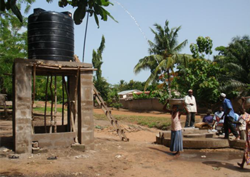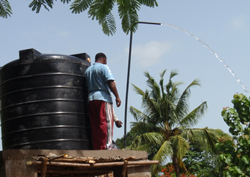

Each year in Africa, more than a million children die from malaria, dysentery, cholera and many intestinal worm infestation and water-borne diseases due to the lack of clean water. These children drink water from ponds infested with intestinal worms. The quasi absence of clean drinking water is a major factor in dysentery and cholera epidemics on the continent. Water being a key to life, our vision at Global Partners for Africa Development is to provide clean drinking one to African children and we made it one of our priorities.
CLEAN WATER & SANITATION.
Unsafe water and lack of basic sanitation cause 80% of diseases and kill more people every year than all forms of violence, including war. Children are especially vulnerable, as their bodies aren’t strong enough to fight diarrhea, dysentery and other illnesses. 90% of the 42,000 deaths that occur every week from unsafe water and unhygienic living conditions are to children under five years old. Many of these diseases are preventable. The United Nation predicts that one tenth of the global disease burden can be prevented simply by improving water supply and sanitation.
In Africa, people spend 40 billion hours every year just walking for water. Women and children usually bear the burden of water collection, walking miles to the nearest source, which is unprotected and likely to make them sick. Time spent walking and resulting diseases keep them from school, work and taking care of their families. Hauling cans of water for long distances takes a toll on the spine and many women experience back pain early in life. With safe water nearby, women are free to pursue new opportunities and improve their families’ lives. Kids can earn their education and build the future of their communities.
Unclean water and a lack of basic sanitation are undermining efforts to end extreme poverty and disease in the world’s poorest countries. Sub-Saharan Africa faces some of the worst deficits- 330 million people in the region lack access to clean water and 565 million lack access to proper sanitation facilities. People living in rural areas continue to be disproportionately underserved, as seven out of ten users of unimproved sanitation facilities live in rural areas. Together, unclean water and poor sanitation are a leading cause of child mortality: an estimated 4,100 children die daily from diarrheal diseases, which are spread through poor sanitation and hygiene. As with many challenges in development, women and girls are disproportionately impacted by scarcities of clean water and adequate sanitation. Women are more than twice as likely as men to be responsible for water collection. On average, women in Africa walk six kilometers each day to collect water, time which could be spent in school or at work. And studies show that more than half of girls who drop out of primary school in sub-Saharan Africa do so because of a lack of separate toilets and easy access to safe water. The effects of lack of access to water and sanitation have a macroeconomic impact as well.
THE SOLUTION…
The goal of Globalpad Africa Development is to create water centers within the village communites by drilling wells and setting up water purification centers. This effort in fact has already began and more information will be shared on this site shortly.
 |
 |





